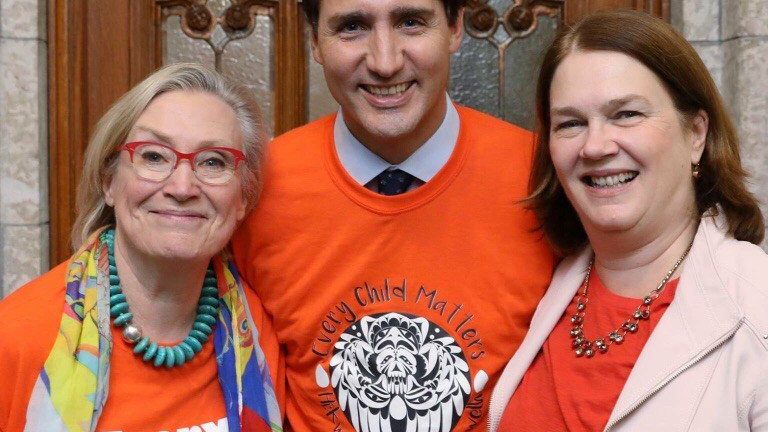I am not wearing an orange shirt today, like some kind of grinning Canadian politician, hoping that a photo-op will wash away my country’s sins. Today is the National Day of Truth and Reconciliation in Canada, a new statutory holiday meant to honor “lost Indigenous children and survivors of residential schools, their families, and communities.” The day falls on Orange Shirt Day, a day historically marked by Indigenous people in Canada to remember the Residential Schools. This is their Yom HaShoah.
I do believe that Canadians need to recognize and atone for the history of the Residential Schools. The revelations over the last few years – indeed, in the last few months alone – have been horrifying. This was a system and policy that produced unimaginable pain and suffering in the name of Canada and all Canadians. I do not know how we can atone for it, but I know that we must try.
I am gratified that the Canadian government has created a day that speaks to “truth and reconciliation,” but this is only a small step. And there is something about the arrogance of the holiday that does not sit well with me. “Reconciliation” without atonement seems to signify a moral equivalence: two parties of equal culpability and power coming together to mend a common wound. Yet there is nothing shared in the history of the Residential Schools; it was an injury inflicted by Canadians on Indigenous people.
What we need to talk about is atonement. The first step in atonement is a confession, an acknowledgment our offense, as we might do by having a day that acknowledges the history of the Residential Schools. But that confession means absolutely nothing without repentance and restitution for the crime. And we must be willing to recognize that our atonement can be rejected, and that it is possible that we may never be able to fully repent and make restitution. That part of it is out of our hands, and true atonement acknowledges that it is the victim, and not the offender who decides when we have made amends.
And there lies reconciliation. It is only through true atonement and repentance that we can become reconciled with Indigenous people. We cannot talk about reconciliation because it is not our gift to give. We cannot extend our hands and expect that the Indigenous people whom we have oppressed, wronged, and abused in so many ways will extent theirs; more importantly, we cannot expect a single moment or act of reconciliation with Indigenous people that will wash away our offenses. Some will accept our atonement, for others, it will take time – and others will never forgive us. Nor should they; Canadians must get used to the idea that, for some people, perhaps many, and in some places, we will always be guilty, and that our atonement will never end.
Yet, the impossibility of attaining reconciliation does not invalidate the necessity of atonement.
I am not wearing an orange shirt because I do not believe that it is my shirt to wear, and because I don’t believe that we have the moral capital to hijack Orange Shirt Day with our National Day of Truth and Reconciliation. I would not feel comfortable if people who are not Jews, or Romani, or the descendants of the people who were murdered in the camps, and killing fields, and in Aktion T4 presumed to mark Yom HaShoah. To see the descendants of the Germans, Poles, Ukrainians, and other Good Christians who allowed the Shoah to happen, or who took an active part in its horrors solemnly mark our day would just make me sick.
It is not their horror, or their calamity; it is not their history. Their place is to stand there silently and listen to us, as we say “never again.”
So, my place on this Orange Shirt Day is not to declare my ownership of “truth and reconciliation,” but to stand and support the truth, and to make amends as best that I can in the hope that someday the people who were oppressed in my name – whom I oppressed – will someday extend their hands and the gift of reconciliation.

